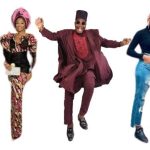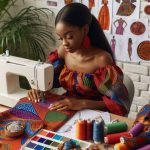In Nigeria, lifestyle trends have always been a reflection of our vibrant culture, resilience, and ability to adapt to the ever-changing global landscape. As we step into 2025, the Nigerian lifestyle is evolving faster than ever, blending technology, culture, and creativity into everyday habits. From fashion to social media, wellness to financial habits, Nigerians are setting trends that not only shape their daily lives but also influence global perceptions of African excellence.
This article takes an in-depth look at the trendy Nigerian lifestyle habits of 2025, touching on fashion, health, technology, food, and social interactions—all while keeping the tone relatable, real, and authentically Nigerian. Whether you’re in Lagos’ bustling streets, Abuja’s polished neighborhoods, or the quiet corners of Calabar, these trends are sure to strike a familiar chord. So, sit back, grab a chilled bottle of Zobo or Chapman, and let’s dive into the pulse of Naija living in 2025.
1. Digital Hustle and Remote Work Culture
In 2025, “work from home” isn’t just a temporary phase—it has become a full-fledged lifestyle in Nigeria. The post-pandemic digital transformation has given rise to more tech-savvy Nigerians who thrive as remote workers, freelancers, and digital entrepreneurs. Platforms like Upwork, Fiverr, and LinkedIn are household names, with many young Nigerians making impressive earnings without ever stepping into a traditional office space.
But this isn’t just about working in pajamas; Nigerians have mastered the art of balancing productivity with relaxation. Co-working spaces in Lagos, Abuja, and Port Harcourt are booming, offering reliable internet, modern workstations, and even networking events. Names like “TechHub Naija” and “WorklySpace Africa” are becoming synonymous with digital hustling.
Key Habit: Nigerians are scheduling “wellness breaks” during work hours to manage stress. Expect to see virtual yoga sessions and midday power naps becoming normal.
2. Sustainable Fashion Takes Center Stage
The Nigerian fashion scene has always been bold, colorful, and innovative. But in 2025, sustainability is stealing the spotlight. Eco-friendly fashion brands are leading the charge, using locally sourced materials, organic dyes, and sustainable production methods.
Thrift shopping, or “Okrika,” has been rebranded as “Pre-loved Fashion,” making it more appealing to middle-class Nigerians. Vintage clothing stores now have Instagram pages with thousands of followers. Local designers like Orange Culture, Lisa Folawiyo, and Mai Atafo are creating timeless pieces with minimal environmental impact.
Key Habit: “Rent-a-fit” services are now a big deal, where Nigerians rent high-end outfits for weddings, birthdays, and parties instead of buying them outright.
3. The Rise of Smart Homes and Tech Integration
The average Nigerian home in 2025 looks very different from five years ago. Smart home devices have become more affordable, and tech integration is no longer exclusive to the elite. Voice assistants, smart lighting, and automated security systems are now commonplace in middle-class Nigerian households.
Young Nigerians are embracing tech-savvy home habits—like controlling their fans, TVs, and lights with voice commands. Apps specifically designed for Nigerian homes, like “NaijaSmart” and “GreenTechHome“, are helping Nigerians reduce energy costs and improve security.
Key Habit: Weekly “Tech-Free Sundays” are emerging as a popular habit, where families disconnect from devices and spend quality time together.
4. Digital Financial Habits and E-Payments
Cash is becoming less common in Nigeria as digital payment platforms dominate transactions. Apps like Flutterwave, Opay, and Moniepoint have revolutionized how Nigerians handle money. In 2025, even roadside vendors in Lagos’ Balogun market accept QR code payments.
Cryptocurrency is no longer just for tech enthusiasts. More Nigerians are investing in digital assets, and financial literacy is becoming a priority among the youth. The rise of “finfluencers” (financial influencers) on social media platforms like TikTok and Instagram has made financial education accessible and fun.
Key Habit: Nigerians are setting automated savings goals on financial apps, with weekly or monthly deductions ensuring consistent saving habits.
5. Health and Wellness Culture Booms
Gone are the days when wellness was considered a luxury for the elite. In 2025, Nigerians across all social classes are prioritizing their health—both physical and mental. From smoothie stands popping up on street corners to gym subscriptions becoming birthday gift items, wellness is mainstream.
Mental health is no longer a taboo topic. Apps offering therapy and counseling services have gained popularity. Schools and workplaces are incorporating mental health education into their programs.
Fitness culture has also gone digital. Online workout challenges, virtual marathons, and home workout equipment are part of everyday life.
Key Habit: Nigerians are embracing “Meal Prep Sundays,” dedicating a day to preparing healthy meals for the week ahead.
6. Content Creation: Everyone is an Influencer
By 2025, almost everyone in Nigeria seems to have a ring light and a smartphone tripod. Content creation isn’t just a hobby anymore—it’s a career path. Platforms like TikTok, Instagram, and YouTube have given rise to a new generation of Nigerian content creators making money from skits, tutorials, and storytelling.
From “food vloggers” showcasing Nigerian delicacies to “street interviewers” capturing everyday conversations, the creativity is endless. Nigerian Gen Z influencers are collaborating with international brands, and the phrase “Omo, content is king!” has become a cultural mantra.
Key Habit: Nigerians are scheduling “Content Days,” setting aside specific days to create and batch-produce content.
7. Food Trends: Fusion Cuisine and Homegrown Brands
Nigerians have always been proud of their cuisine, and in 2025, food trends are a delightful blend of tradition and innovation. Fusion cuisine—where Nigerian dishes are combined with international flavors—is trending. Think Egusi pasta or Jollof sushi.
Local food brands are also thriving. Snacks like Plantain chips and Kuli-Kuli are now being exported globally. Street food culture remains strong, with food trucks offering everything from Suya wraps to Puff-puff burgers.
Key Habit: Nigerians are hosting “Cookout Sundays,” where friends and families gather to experiment with new recipes.
8. Social Events: Hybrid Gatherings Are the Norm
Social gatherings in Nigeria have always been vibrant, and in 2025, they’re even more dynamic. Hybrid events—where physical and virtual attendees coexist—are now common. Whether it’s weddings, birthday parties, or corporate events, technology ensures no one misses out.
Platforms like Zoom Plus Naija have improved virtual party experiences with features like virtual drink deliveries and live DJs. Even traditional events like Owambe have digital RSVP systems and live-streaming options.
Key Habit: Nigerians are incorporating “virtual party favors,” where digital gift cards are sent to online attendees.
9. Travel Culture: Exploring Nigeria First
Traveling isn’t just about Dubai or the Maldives anymore. In 2025, Nigerians are rediscovering the beauty of their own country. Local tourism is booming, with destinations like Obudu Mountain Resort, Yankari Game Reserve, and Idanre Hills becoming must-visit spots.
Travel vloggers and influencers are documenting their journeys, inspiring more Nigerians to plan local getaways. Travel packages designed for group tours are more accessible, and many Nigerians now have “annual travel goals.”
Key Habit: “Staycation weekends” are becoming a trend, where people book a nice hotel within their city to relax and recharge.
10. Environmental Awareness and Green Living
Sustainability isn’t just a buzzword anymore—it’s a lifestyle. Nigerians are becoming more environmentally conscious, embracing habits like recycling, reducing plastic use, and planting trees.
Schools are including environmental education in their curriculum, and brands are adopting eco-friendly practices. The Lagos state government is even incentivizing green living with discounts for citizens who recycle.
Key Habit: Nigerians are now hosting “Green Saturdays,” where families and communities dedicate time to environmental cleanup projects.
Conclusion
The Nigerian lifestyle in 2025 is a beautiful mix of tradition, innovation, and global influence. From digital hustling to sustainable fashion, mental health awareness to fusion cuisine, Nigerians are embracing change while holding onto their cultural roots. These trends don’t just represent habits—they symbolize a collective shift towards a more connected, creative, and conscious society.
As we move forward, one thing is clear: Nigerians will continue to set trends, break barriers, and redefine what it means to live boldly in an ever-evolving world.
So, whether you’re hustling on your laptop from a beach in Lekki, sipping freshly squeezed Zobo in Enugu, or sharing your travel adventures on TikTok, remember—Naija no dey carry last!







Leave a Reply